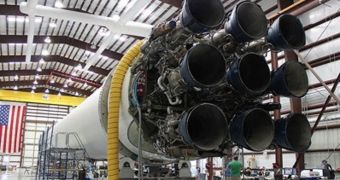Engineers at the private spaceflight company Space Exploration Technologies Corporation (SpaceX) announced that they were able to pass a key test this Wednesday, when they fueled the second Falcon 9 rocket the group built.
SpaceX is under contract with NASA to develop capabilities that would ensure uninterrupted American access to low-Earth orbit (LEO) and the International Space Station (ISS), once the shuttles are retired.
What officials at the company are planning is to use the Falcon 9 medium-lift delivery system to boost the Dragon space capsule into LEO.
Though originally planned as an unmanned cargo spacecraft, the Dragon can also be transformed into a manned capsule, say SpaceX experts.
The contract NASA has with the Hawthorne, California-based company calls for a number of demonstration flights in the next couple of years, that are to demonstrate both Falcon 9's and Dragon's capabilities.
As part of these efforts, the company recently rolled out its second-ever Falcon 9 vehicle. The event took place at the Cape Canaveral Air Force Station (CCAFS), in Florida.
SpaceX has access to the facility' Pad 40, and to related hangars, which it uses to assemble, test, and eventually launch its rockets.
This Wednesday, engineering team did a preflight countdown rehearsal, during which they actually fueled the two-stage rocket with its liquid oxygen and kerosene fuels.
The key exercise went on without a hitch, confirming that the company is on track to its second successful launch. At this time, SpaceX officials have reserved October 23 as a possible launch data with the USAF Eastern Range.
This time, when it launches, the Falcon 9 will carry a fully-functional version of the Dragon spacecraft, and not only a demonstrator. The spacecraft is to make one to three orbits around Earth.
If all goes according to plan, it will then splash down in the Pacific Ocean off the coast of California, from where it will be retrieved and properly analyzed.
Soon, SpaceX will perform a short ignition test, which will allow them to analyze whether Falcon 9's Merlin engines are working properly.
The Hawthorne company and Orbital Sciences Corporation are the two main contractors that need to develop private spacecraft that can reach the ISS in the next couple of years.
Orbital's Cygnus cargo capsule is to fly to LEO by the end of 2011, Space reports.

 14 DAY TRIAL //
14 DAY TRIAL //